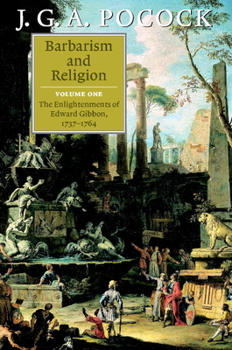Book Overview
'Barbarism and Religion' - Edward Gibbon's own phrase - is the title of an acclaimed sequence of works by John Pocock designed to situate Gibbon, and his Decline and Fall of the Roman Empire, in a series of contexts in the history of eighteenth-century Europe. This is a major intervention from one of the world's leading historians of ideas, challenging the notion of any one 'Enlightenment' and positing instead a plurality of enlightenments, of which the English was one. In this first volume, The Enlightenments of Edward Gibbon, John Pocock follows Gibbon through his youthful exile in Switzerland and his criticisms of the Encyclop?die, and traces the growth of his historical interests down to the conception of the Decline and Fall itself.
Format:Paperback
Language:English
ISBN:0521797594
ISBN13:9780521797597
Release Date:June 2009
Publisher:Cambridge University Press
Length:356 Pages
Weight:1.28 lbs.
Dimensions:0.8" x 6.0" x 9.1"
Customer Reviews
1 rating
Enlightenments, Not Enlightenment
Published by Thriftbooks.com User , 17 years ago
This is the introductory volume to Pocock's masterful study of Gibbon and the Enlightenment. The volume is readable and intensely well-written--clarifying abstract and arcane philosophical and historical minutiae with finesse and grace. The historian's writing style is easily gotten used to and anyone who's read Gibbon will certainly appreciate the aesthetics of Pocock's narrative. Readers used to Hemingway's style might find some getting used to the longer paragraphs but even the Grand Old Man appreciated master storytellers. And Pocock is surely that and more. This is easily the greatest work by one of the greatest English-speaking historians in history. Pocock's master-plan is ambitious and you might need to reread some chapters to get the full impact and import of what he's saying. He marshals some powerful analytical tools to arrange his material but the technical apparatus rarely shows, unless you go looking for it. Should yo do so, you'll find not only a master narrativist but also a formidable philosopher working behind the scenes. The book, as you might guess, is not simply about Gibbon the historian. It is also about how historians write history and how, especially, the historian is influenced by the ideas and assumptions of their lives and the times they live in and through. In this way, Pocock's work here is as much about Gibbon as it is about the Enlightenment. Therefore, in the process of delving into Gibbon's life and thought, we also come into contact with Hume, Voltaire, and Adam Smith. Pocock unearths some starling angles of interpretation on the Enlightenment that undermine the stereotypes of that era. Perhaps one of Pocock's more arresting assertions is that there was not just one Enlightenment but several Enlightenments. This insight alone is worth the price and time spent on getting the entire series.





